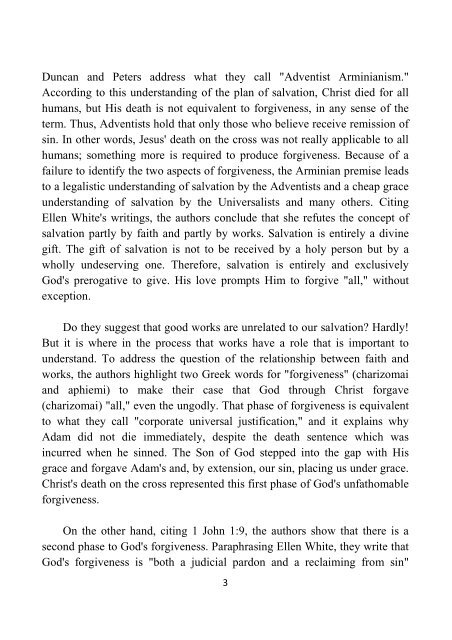Message of the Latter Rain - Kelvin M. Duncan
You also want an ePaper? Increase the reach of your titles
YUMPU automatically turns print PDFs into web optimized ePapers that Google loves.
<strong>Duncan</strong> and Peters address what <strong>the</strong>y call "Adventist Arminianism."<br />
According to this understanding <strong>of</strong> <strong>the</strong> plan <strong>of</strong> salvation, Christ died for all<br />
humans, but His death is not equivalent to forgiveness, in any sense <strong>of</strong> <strong>the</strong><br />
term. Thus, Adventists hold that only those who believe receive remission <strong>of</strong><br />
sin. In o<strong>the</strong>r words, Jesus' death on <strong>the</strong> cross was not really applicable to all<br />
humans; something more is required to produce forgiveness. Because <strong>of</strong> a<br />
failure to identify <strong>the</strong> two aspects <strong>of</strong> forgiveness, <strong>the</strong> Arminian premise leads<br />
to a legalistic understanding <strong>of</strong> salvation by <strong>the</strong> Adventists and a cheap grace<br />
understanding <strong>of</strong> salvation by <strong>the</strong> Universalists and many o<strong>the</strong>rs. Citing<br />
Ellen White's writings, <strong>the</strong> authors conclude that she refutes <strong>the</strong> concept <strong>of</strong><br />
salvation partly by faith and partly by works. Salvation is entirely a divine<br />
gift. The gift <strong>of</strong> salvation is not to be received by a holy person but by a<br />
wholly undeserving one. Therefore, salvation is entirely and exclusively<br />
God's prerogative to give. His love prompts Him to forgive "all," without<br />
exception.<br />
Do <strong>the</strong>y suggest that good works are unrelated to our salvation? Hardly!<br />
But it is where in <strong>the</strong> process that works have a role that is important to<br />
understand. To address <strong>the</strong> question <strong>of</strong> <strong>the</strong> relationship between faith and<br />
works, <strong>the</strong> authors highlight two Greek words for "forgiveness" (charizomai<br />
and aphiemi) to make <strong>the</strong>ir case that God through Christ forgave<br />
(charizomai) "all," even <strong>the</strong> ungodly. That phase <strong>of</strong> forgiveness is equivalent<br />
to what <strong>the</strong>y call "corporate universal justification," and it explains why<br />
Adam did not die immediately, despite <strong>the</strong> death sentence which was<br />
incurred when he sinned. The Son <strong>of</strong> God stepped into <strong>the</strong> gap with His<br />
grace and forgave Adam's and, by extension, our sin, placing us under grace.<br />
Christ's death on <strong>the</strong> cross represented this first phase <strong>of</strong> God's unfathomable<br />
forgiveness.<br />
On <strong>the</strong> o<strong>the</strong>r hand, citing 1 John 1:9, <strong>the</strong> authors show that <strong>the</strong>re is a<br />
second phase to God's forgiveness. Paraphrasing Ellen White, <strong>the</strong>y write that<br />
God's forgiveness is "both a judicial pardon and a reclaiming from sin"<br />
3

















